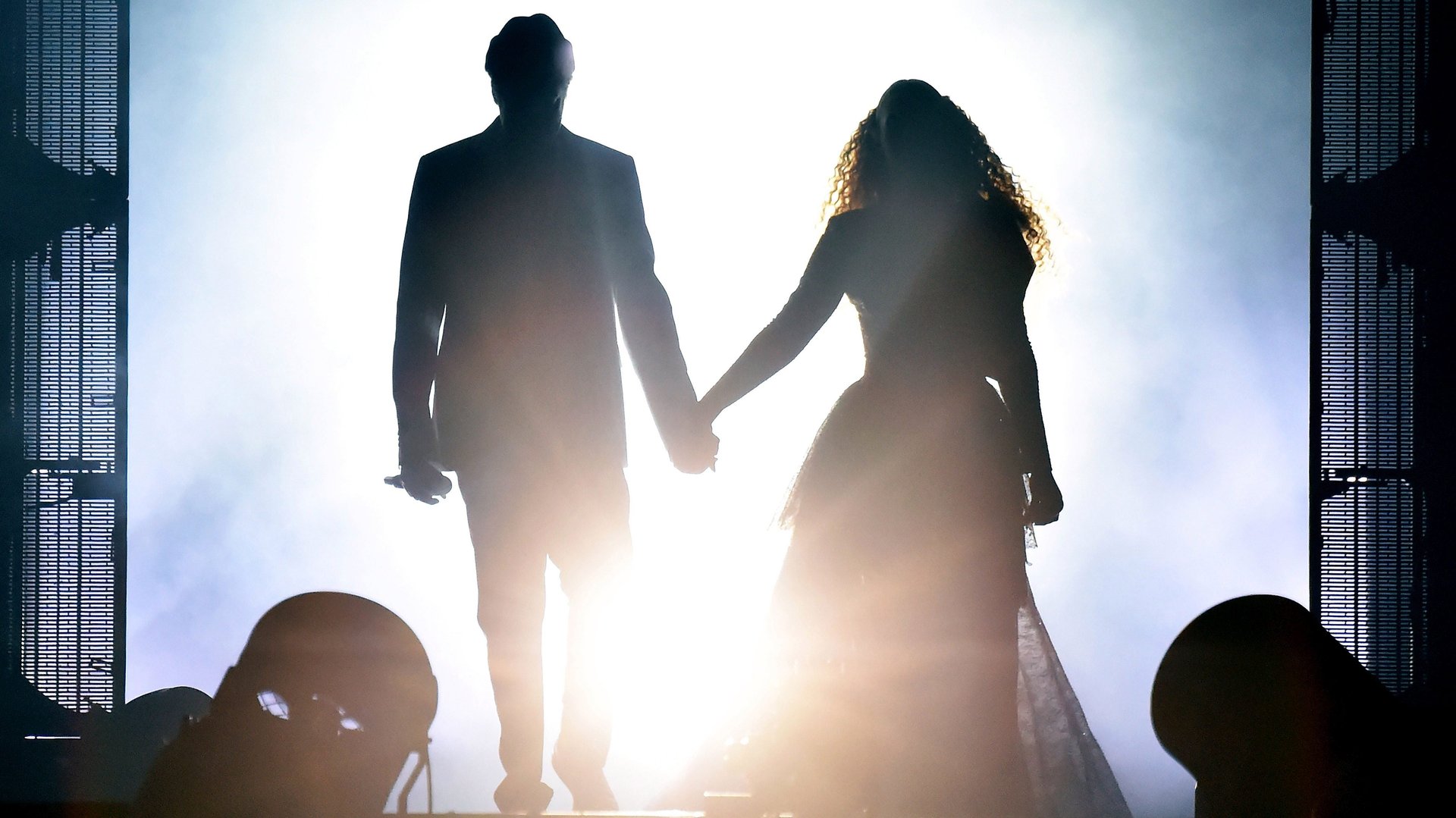The “On the Run II” tour is giving Bey and Jay fans something to believe in
In a video from June 6, the opening night of Beyoncé and Jay-Z’s On the Run II tour in Wales, a towering black screen blazes with stark capital white letters, lighting up with the words, one-by-one: “THIS … IS … REAL … LIFE.”


In a video from June 6, the opening night of Beyoncé and Jay-Z’s On the Run II tour in Wales, a towering black screen blazes with stark capital white letters, lighting up with the words, one-by-one: “THIS … IS … REAL … LIFE.”
Those who saw the first On the Run tour, which Beyoncé and Jay-Z co-headlined in 2014, might remember this phrase. At the beginning of those shows, as captured in the HBO concert-movie tour de force of the same name, a video declared: “THIS IS NOT REAL LIFE,” before a 40-odd song set interspersed with black-and-white music video vignettes of Bey and Jay in Bonnie-and-Clyde style capers.
Towards the end of the film, Beyoncé slowly sings the opening bars of “Young Forever”—Jay-Z’s epic song about a “life like a video, where the sun is always out and you never get old”—while her husband, with an open gaze and a slightly furrowed brow, looks first at his wife, and then out to the vast crowd, which flickers with thousands of twinkling lighters and cellphones.
A text card then flashes on screen, undoing that original disclaimer: THIS IS REAL LIFE.
In the duet that follows, footage of Beyoncé singing while her husband raps on stage alongside her is spliced together with home videos of the couple—toasting sunlit champagne flutes, holding hands at their wedding, gazing at a newborn Blue Ivy in a hospital bed.
The first time I watched this unfold, four years ago, I wept—wept!—on my sofa, with the same phrase repeating over and over again in my mind: I want to believe.
I wanted to believe not only in the lyrics of the song, but in Beyoncé and Jay-Z’s marriage, a seemingly supportive and symbiotic relationship between two creative dynamos, who not only managed to work together to create the performance onstage, but also a healthy, beautiful daughter. And they seemed to have fun and love each other, and even have time for vacations, while doing it. That this was real life.
By that time, in September of 2014, rumors were already swirling about Jay-Z’s infidelities. A few months earlier, elevator security cameras had caught Beyoncé’s younger sister Solange smacking Jay-Z furiously at the Met Gala, fueling speculation about what might have inspired such rage in a protective sibling. Which only made Bey and Jay’s onstage performance of faithfulness, love, and support feel more fraught.
I want to believe.
Although we put Beyoncé on an unfathomably high pedestal—woe betide the woman who compares herself to Queen Bey—there’s also something uniquely relatable about her. The limited emotional access she gives her fans allows us to project upon her. She is superwoman, but, in a strange way, she’s also everywoman. At least, she manages to evoke and embody the many complicated aspects and images of womanhood that we encounter, and often aspire to. She is a goddess and a girl-next-door; a loving mother and a badass boss; a caring sister and a smoldering stripper, in utter control of her sexuality.
Beyoncé is empowering in the sense that when I watch her dance, there is a delusional part of myself that truly believes: I too, can dance like that.
This may be why, two years after that duet, when Beyoncé confirmed our worst suspicions on the visual album Lemonade, Jay-Z’s betrayal felt like it was exacted on all of us, prompting us ask the heavens (or at least, Twitter): If this happens to Beyoncé, who among us is safe? My 70-year-old mother—who divorced my father after confirming a similar suspicion 15 years prior—quoted the lyrics of “Hold Up,” the second track on Lemonade, to me: “What’s worse, lookin’ jealous or crazy?” and then explained: “I felt like this young woman was speaking to me.”
That song—with its accompanying video of Beyoncé gloriously smashing car windows—opened a narrative that closed with songs about reconciliation and redemption. It might not surprise the reader to learn I bawled through “Sandcastles,” a piano ballad that describes the heart-wrenching aftermath of a broken relationship but also—lo!—contains some glimmers of hope, including Jay-Z’s presence in the video, humbly kissing Bey’s hands. Is this a flashback? Is he asking for forgiveness? Could this end well for both of them, together? I want to believe.
While the songs that follow “Sandcastles” (the eighth track on Lemonade) suggested a happy ending, countless close readings of the album speculated otherwise: that cheaters don’t change, that the songs amounted to a mic drop on the marriage.
But the mic didn’t drop. She got pregnant with twins, and was a resplendent, rotund goddess at the 2017 Grammys. Her husband was on her arm on the red carpet, and then held Blue Ivy on his lap while Beyoncé performed. Later that year, Jay-Z released his own long-awaited album, 4:44, its title track a stripped-down, self-flagellating apology for his dishonesty and a declaration of his undying love. In interviews, he talked about facing the pain he caused, working on his marriage in therapy, and learning to be vulnerable. This all felt deeply promising.
So it stands to reason that the romantics among us might experience a swelling in our chests as the first shaky videos and images trickle onto social media from the first night of On the Run II: the couple sharing the stage for songs like “’03 Bonnie and Clyde” and “Young Forever”—with new home videos, including footage suggesting the couple renewed their vows with the twins as witnesses—and Beyoncé serenading her husband with Ed Sheeran’s “Perfect,” as he brushes strands of windblown hair from her shoulders.
“This is real life.”
Is it, really? I don’t know. But I want to believe.